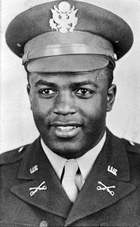Jackie Robinson
Hall of Famers at War
| Date and Place of Birth: | January 31, 1919 Cairo, GA |
| Date and Place of Death: | October 24, 1972 Stamford, CT |
| Baseball Experience: | Hall of Fame |
| Position: | Infield |
| Rank: | Second Lieutenant |
| Military Unit: | 761st Tank Battalion US Army |
| Area Served: | United States |
Jack R. "Jackie" Robinson was born in Cairo, Georgia, on January 31,
1919. The year after his birth his family moved to Pasadena, California.
He graduated from Dakota Junior High School in 1935 and enrolled at John
Muir High School where he played baseball, football, basketball, tennis,
and track and field.
In 1936, he captured the junior boys singles championship in the annual
Pacific Coast Negro Tennis Tournament, starred as quarterback, and
earned a place on the annual Pomona baseball tournament all-star team,
which included future Baseball Hall of Famers Ted Williams and Bob
Lemon. Robinson later attended Pasadena Junior College where he played
both football and baseball. He played quarterback and safety for the
football team, shortstop for the baseball team.
In 1938, he was elected to the All-Southland Junior College baseball
team and selected as the region's Most Valuable Player. After leaving
Pasadena Junior College, Robinson chose to attend the University of
California, Los Angeles, where he became the school's first athlete to
win varsity letters in four sports: baseball, basketball, football and
track.
Robinson left UCLA before completing his degree in 1941 and went to
Hawaii to play football for the semi-professional, racially integrated
Honolulu Bears. He returned to California on December 5, 1941 two days
before the Japanese attack on Pearl Harbor and was drafted the following
year.
On April 3, 1942, Robinson entered the US Army, attended officer
candidate school, and was commissioned a second lieutenant in 1943. He
served at Fort Riley, Kansas in 1943 and then Fort Hood, Texas. Robinson
was one of the few African-American officers at Fort Hood and when he
refused to sit in the back of a military bus in 1944, he was
subsequently court martialed, but acquitted because the order was a
violation of War Department policy prohibiting racial discrimination in
recreational and transportation facilities on all US Army posts.
In the summer of 1944, when Robinson was a lieutenant in the 761st Tank
Battalion at Fort Hood, a broken ankle he had suffered playing football
back in 1932 kept him from going overseas with his outfit. "My CO sent
me to the hospital for a physical checkup," he told Yank magazine on
November 23, 1945, "and they changed my status to permanent limited
service. After that I kicked around the tank destroyers doing a little
bit of everything. Then I wound up as a lieutenant in an infantry
battalion at Camp Breckinridge. In October 1944 I was given a 30-day
leave and put on inactive duty. I'm still on inactive duty. What I'd
like to know is, do I have to go back into active duty to get separated
or will they just notify me that I'm out?"
He received a medical discharge on November 28, 1944.
Robinson played shortstop for the Negro American League Kansas City
Monarchs in 1945 and batted .345 with five home runs, and made an
all-star appearance. Branch Rickey, president of the Brooklyn Dodgers
began to scout the young Negro League player and signed him on October
23, 1945. Robinson was became the first African-American in 57 years to
break the Organized Baseball color line. "I realize what I'm going
into," he said at the time. "I realize what it means to me and to my
race and to baseball, too. I'm very happy for this chance and I can only
say that I'll do my best to make the grade."
The young infielder reported to the Montreal Royals in 1946. He lead the
International League with a .349 batting average, and made his major
league debut with Brooklyn on April 15, 1947, winning The Sporting News
Rookie of the Year Award.
In ten major league seasons he appeared in six World Series and six
All-Star games, and led the National League in batting with a .342
average in 1949, clinching the National League Most Valuable Player
Award. Robinson retired on January 5, 1957. He had wanted to manage or
coach in the major leagues, but no offers came his way. Instead, he
became a vice-president for the Chock Full O' Nuts corporation.
He was inducted into the Baseball Hall of Fame in 1962, his first year
of eligibility, becoming the first African-American so honored. Robinson
was suffering from high blood pressure and diabetes, and he was all but
blind when he died from a heart attack at the age of 53 in October 1972.
In March 1984, President Ronald Reagan posthumously awarded Robinson the
Presidential Medal of Freedom.
On April 15, 1997, the 50th anniversary of his debut, Major League
Baseball retired the number 42, the number Robinson wore, in recognition
of his accomplishments both on and off the field. On October 29, 2003,
the United States Congress posthumously awarded Robinson the
Congressional Gold Medal, the highest award the Congress can bestow.
Robinson's widow accepted the award in a ceremony in the Capitol Rotunda
on March 2, 2005.
On April 15, 2007, the 60th anniversary of Robinson's major league
debut, Major League Baseball invited players to wear the number 42 just
for that day to commemorate Robinson. More than 200 players wore number
42, including the entire rosters of the Los Angeles Dodgers, Houston
Astros, Philadelphia Phillies, St. Louis Cardinals, Milwaukee Brewers,
and Pittsburgh Pirates.
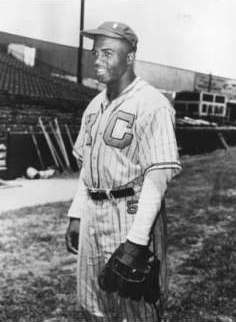
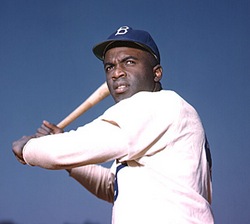
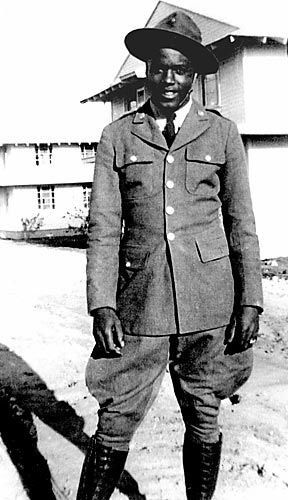
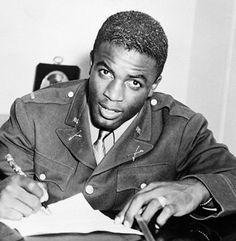
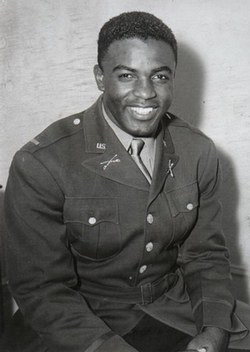
Date Added July 26, 2016
Jackie Robinson at Baseball-Almanac
Can you add more information to this biography and help make it the best online resource for this player? Contact us by email
Read Baseball's Greatest Sacrifice Through The Years - an online year-by-year account of military related deaths of ballplayers
Baseball's Greatest Sacrifice is associated with Baseball Almanac
Baseball's Greatest Sacrifice is proud to be sponsored by

